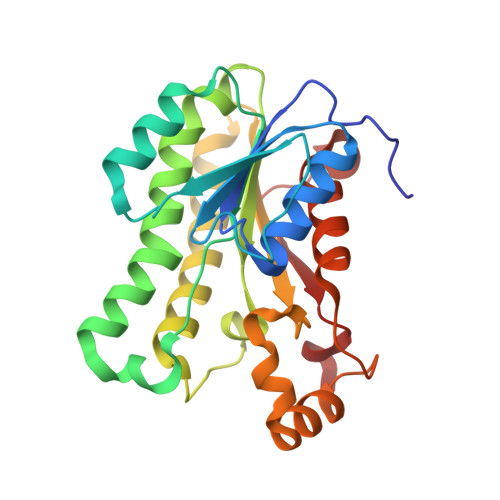The Aeropath Project Targeting Pseudomonas Aeruginosa: Crystallographic Studies for Assessment of Potential Targets in Early-Stage Drug Discovery
Moynie, L., Schnell, R., Mcmahon, S.A., Sandalova, T., Boulkerou, W.A., Schmidberger, J.W., Alphey, M.S., Cukier, C., Duthie, F., Kopec, J., Liu, H., Jacewicz, A., Hunter, W.N., Naismith, J.H., Schneider, G.(2013) Acta Crystallogr Sect F Struct Biol Cryst Commun 69: 25
- PubMed: 23295481
- DOI: https://doi.org/10.1107/S1744309112044739
- Primary Citation of Related Structures:
2XU8, 4AVF, 4AVR, 4AVY, 4B79, 4B7C, 4B7X, 4B9A, 4B9E, 4ES6, 4ETR, 4EXA, 4EXB - PubMed Abstract:
Bacterial infections are increasingly difficult to treat owing to the spread of antibiotic resistance. A major concern is Gram-negative bacteria, for which the discovery of new antimicrobial drugs has been particularly scarce. In an effort to accelerate early steps in drug discovery, the EU-funded AEROPATH project aims to identify novel targets in the opportunistic pathogen Pseudomonas aeruginosa by applying a multidisciplinary approach encompassing target validation, structural characterization, assay development and hit identification from small-molecule libraries. Here, the strategies used for target selection are described and progress in protein production and structure analysis is reported. Of the 102 selected targets, 84 could be produced in soluble form and the de novo structures of 39 proteins have been determined. The crystal structures of eight of these targets, ranging from hypothetical unknown proteins to metabolic enzymes from different functional classes (PA1645, PA1648, PA2169, PA3770, PA4098, PA4485, PA4992 and PA5259), are reported here. The structural information is expected to provide a firm basis for the improvement of hit compounds identified from fragment-based and high-throughput screening campaigns.
- Biomedical Sciences Research Complex, University of St Andrews, St Andrews KY16 9ST, Scotland.
Organizational Affiliation:
















